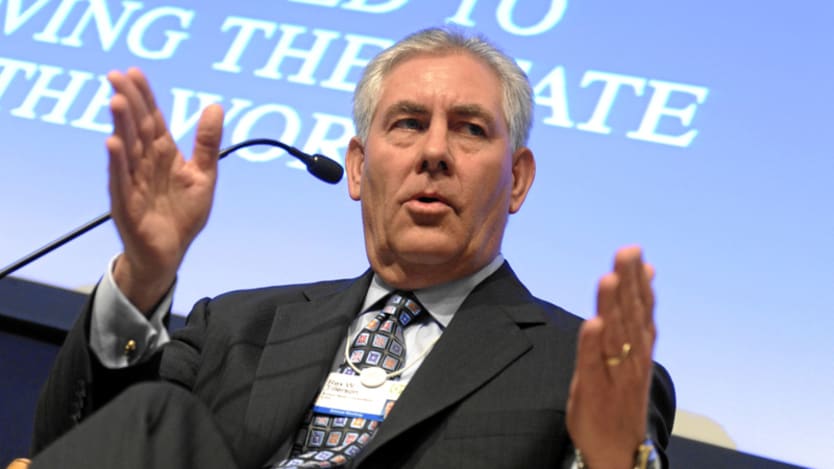
The basic story lines of Rex Tillerson’s upcoming confirmation hearings before the Senate Foreign Relations Committee on Wednesday are easy to predict. Russia will be at the top of the agenda. Democrats will seek to dominate the news cycle with pointed questions that the nominee will dodge; Republicans will deliver bombastic speeches that require no response.
But Tillerson — and the rest of the world — will learn as much from the questions senators overlook as from the ones they pose. The problem is that with Tillerson’s limited background in foreign policy — and with a president-elect whose own views are contradictory and fluctuating, to the extent they are known at all — Tillerson will not be prepared to give an authoritative or substantive reply.
What we know about Exxon's Rex Tillerson and his likely impact on development
The ExxonMobil CEO's record on climate change — and lack of direct experience in development and aid — is raising some concern in the development industry over how he will lead as secretary of state.
Under these circumstances, asking serious questions is a risky proposition. Such queries could trigger an ill-considered policy statement that is difficult to reverse. A flub by Tillerson will be more uncomfortable for members of the committee than for the nominee himself, because most of them plan on voting for him regardless.
While it may seem politically foolish to get Tillerson on record now, before he has had time to be fully briefed and consider all the options, it will seem far more irresponsible later to have confirmed a secretary of state whose basic instincts and judgment are not to be trusted. At a minimum, senators and the American public have a right to expect answers to the following four questions on foreign aid and development:
1. Role of development in U.S. foreign policy.
Republicans and Democrats alike recognize the importance of international development as an investment in U.S. security and prosperity and a reflection of American values. It is one of the few areas where both parties, both chambers, and both branches have worked together in recent years; during the 114th Congress alone, at least five pieces of development-related legislation were enacted. Development is now accepted as a core pillar of American foreign policy, on par with defense and diplomacy. So the question for Tillerson: Do you agree that development should be a mainstay of U.S. foreign policy?
2. Development priorities.
The George W. Bush administration made historic advances in development through the creation of the President’s Emergency Plan for AIDS Relief and the Millennium Challenge Corp. Under President Barack Obama, development goals were advanced through initiatives on global food security and expanding access to power in Africa. Under your leadership, the ExxonMobil Foundation focused its global philanthropic investments on malaria eradication and women’s economic opportunity. As secretary, what would be your development priorities?
3. Foreign aid budget.
Most Americans have a wildly inflated notion of how much the U.S. spends assisting other countries, guessing on average that 26 percent of the budget goes for this purpose. In reality, foreign assistance comprises less than 1 percent of the federal budget, yet it brings huge benefits to the American people. It advances U.S. national security by helping countries to combat terrorism, stem proliferation of weapons of mass destruction, improve law enforcement and narcotics control, and prevent conflicts from turning violent. Foreign assistance strengthens the domestic economy by expanding markets for U.S. goods and services, improving labor standards to level the playing field for American workers, and reducing pressure for economic migration. And it reflects American values and moral principles by saving lives, reducing suffering, and protecting human dignity. Despite growing international humanitarian and security challenges, funding levels have remained basically flat for the past eight years. Do you believe that current levels of foreign aid are adequate for the task at hand?
4. Future of reform.
Foreign aid is not what it was 25 years ago, at the end of the Cold War. The U.S. Agency for International Development has overhauled its systems for planning, budgeting, managing, monitoring and evaluating aid, making programs more efficient and more effective. New programs and institutions have been created, such as PEPFAR and the MCC. Still, there are proposals for further improvements, such as the bipartisan call by former USAID administrators to upgrade USAID to a cabinet-level department, and the recommendation of the Global Development Council to combine several existing agencies and authorities into a U.S. development finance bank. What further aid reforms, if any, do you believe are needed?
These, of course, are not the only questions that Tillerson should be called to answer before his nomination is considered. Due diligence requires that senators probe his potential conflicts of interest, as well as his views on the role of human rights in U.S. foreign policy, the future of nuclear arms control, the challenges posed by global climate change, and the capacity of the foreign service, among other issues.
Unfortunately, senators may be called to choose between confirming someone whose views are unknown and malleable, and confirming someone whose views are known and unpalatable.
Stay tuned to Devex for more news and analysis of what the Trump administration will mean for global development. Read more coverage here and subscribe to The Development Newswire.








